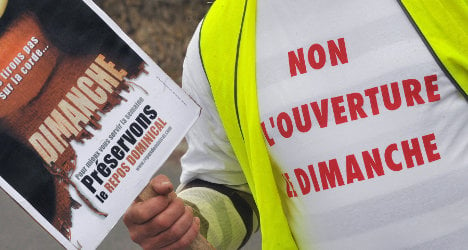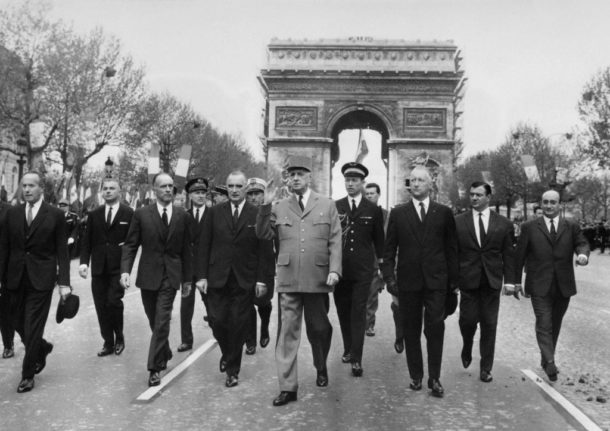French workers protested outside Paris on Friday, demanding the right to work on Sunday. The demonstrations at Créteil and Bobigny followed a court ruling this week that two major retailers keep 15 of their Paris-area stores shuttered on Sundays.
The ‘tribunal de commerce’ (trade tribunal) this week ordered two major French DIY chains – Castorama and Leroy Merlin – to keep 15 of their stores shuttered on Sundays, following a complaint from a competitor who had previously been forced to do the same.
In January 2012, the Bricorama DIY chain was prevented from opening any of its Paris-area stores on Sundays, and forced to look on as two of its biggest competitors – Castorama and Leroy Merlin – hoovered up Sunday business.
In July, Bricorama complained to the trade tribunal at Bobigny that the resulting unequal playing field amounted to “an imminent harm caused by a loss in turnover and customers, to the benefit of [its] competitors Leroy Merlin and Castorama.”
In its verdict on Thursday, the court agreed, labelling it a “flagrant violation” of the law that Castorama and Leroy Merlin had been able to carry on opening on Sundays.
France has strict rules regulating retailers’ opening hours, derived from a long tradition of "le repos dominical" – protecting Sunday as a “day of rest” for workers.
SEE ALSO: Top 10 – What drives expats mad about French working culture

In major cities such as Paris, some retailers are excluded from this ban on “travail dominical” (Sunday work) by being located in what’s known as a PUCE, or “périmètre d’usage de consommation exceptionnel” (exceptional consumer usage zone).
In cities of more than one million inhabitants, and in neighbourhoods which are popular with tourists, or already have a demonstrable tradition of Sunday consumer activity, retailers are allowed to open, but only on the strict condition that they not to force any of their employees to work on Sundays.
Shopping excursions to London on Sundays
With France experiencing record high unemployment and economic stagnation, however, critics have argued that it might be necessary to be more flexible in terms of working culture, in order to create jobs and compete on a global level.
Centre-right UMP candidate for Paris mayor, Nathalie Kosciusko-Morizet (known as NKM), this week called for an “extension” of Sunday opening in the French capital, a move which she predicted could create 10,000 new jobs.
SEE ALSO: In defense of – French working culture
In an interview with Metro News on Wednesday, NKM lamented the fact that, because of the ban of Sunday opening, tour operators in Paris were running shopping trips to London every week.
“This is economic manna from heaven, and we need to keep it in the capital,” said the former protégé and campaign advisor to ex-French president Nicolas Sarkozy.
Explaining her desire to loosen restrictions on Sunday retail, NKM added: “Employees want to work [on Sundays], and businesses make at least 20 percent of their weekly turnover that day.”
'I don't care if stores are open all night in New York – this is France'
At the instigation of labour unions, France has seen a series of controversial court orders recently, forcing multinational retailers like Apple to limit their opening hours, despite the desire of many employees to work more for extra pay.
On Monday, a court ordered cosmetics giant Sephora to close its flagship Paris store on the Champs Elysées, at 9pm.
It had been staying open until midnight on weekdays and up to 1:00 am on Fridays and Saturdays to capitalise on demand for late-night shopping opportunities from tourists visiting the French capital.
The move to get the store to close was initiated by the Clic-P umbrella grouping of five unions.
Prior to Monday's ruling, 58 of the store's 200 employees would regularly volunteer for late-night work, and several of them were left fuming over the unions' initiative.
Sephora saleswoman Ines Sampiecro told AFP: "We have been stabbed by the unions." The unions, however, has been quick to defend their actions.
"I don’t care if you can go to the Apple store or Sephora store in New York at any time of the night," Eric Sherrer, from the Clic-P group, told The Local this week.

"If they respect the laws there, good for them, but this is France."
The ruling against Sephora follows a string of similar union-initiated moves against Apple, Japanese casual wear designer Uniqlo, supermarket chain Monoprix and the famed Paris department store Galeries Lafayette.
Don't miss stories like this – join us on Facebook and Twitter.




 Please whitelist us to continue reading.
Please whitelist us to continue reading.
Member comments